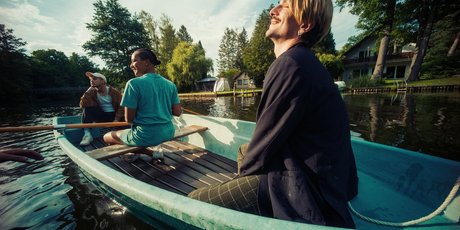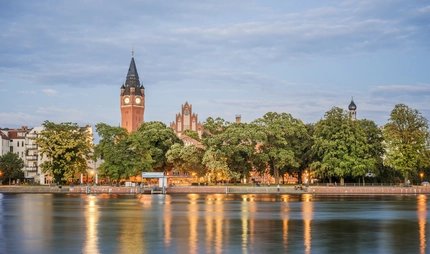
Neu-Venedig
Italian Adriatic flair in the middle of a pulsing metropolis
In the south-eastern corner of Berlin you will find the residential settlement of Neu-Venedig. Just like in Italy, the Müggelspree branches into canals – you mustn’t miss it.
With its five canals and 13 bridges it might not be quite as big as its Italian inspiration, but it’s at least as charming, and you’ll feel it as soon as you arrive in Neu-Venedig in Köpenick.
A hidden gem in Köpenick
One of the most beautiful and least-known places in Berlin is hidden away between the lakes Müggelsee and Dämeritzsee. It’s a settlement of residential and holiday homes that can’t be explored in a gondola or a Spreewald barge, but is perfectly accessible by small boat or canoe. Typically for Berlin, it’s authentic and relaxed. Neu-Venedig is one of the city’s best-kept secrets for sightseers. Succumb to the charms of Berlin’s little Venice with its water lilies and swans – either on foot or on a bicycle tour.
The beginnings of Neu-Venedig
The story of Neu-Venedig began in 1890, when the town of Köpenick purchased the estates of Rahnsdorf and Hessenwinkel. Originally, the marshy ground was to be drained so that housing could be built there, but in 1926, canals were built instead, giving water sports enthusiasts direct access to the Müggelspree. The five kilometres of newly created waterways originally gained the nickname “New Cameroon”. It was only later that comparisons were drawn with Venice and the Italian lagoons.
Dachas for East German ministers
When Neu-Venedig was created in 1928, it was divided into 374 waterside plots. The number has since risen to 450. Small villas were built on the outside of the leisure settlement, with summer houses in the middle. From 1961, privileged GDR citizens leased the property of West Berliners. Neu-Venedig became a popular place for the small weekend homes known as dachas. Later, the plots were returned to their legal owners.
Traditional cuisine in Neu-Venedig
A restaurant as famous as the area itself offers traditional cuisine to restore the strength of hungry boaters and tourists seeking relaxation. The country pub has a large garden directly by the waterside.


